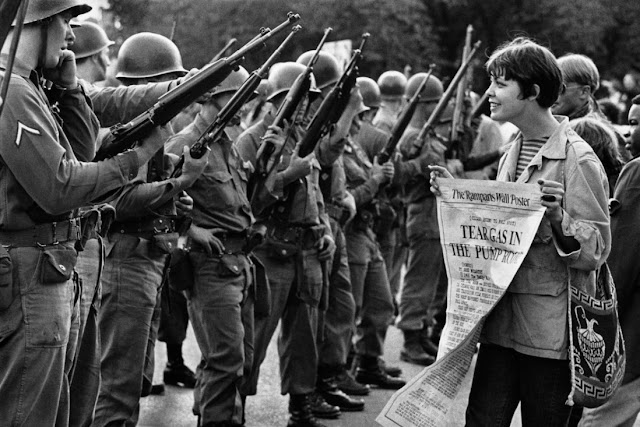I didn't intend for this to be so long, but it's now running on its own fumes. I wanted merely to explain how it is to live here in one of the darkest, red-est counties in the country, a place where I vote consistently Democratic. I'm working on a memoir to have available should my great-grandchildren, somewhere down the line, ever want to find out more about that odd ancestor.
Honestly, I wish I knew much more about my own great-grandparents, what they dreamed of, what they thought. A couple of years ago, I determined to create something almost quilt-like--a collection of arranged stories, blog posts, cuttings from novels, meditations, and essays of mine that, when gathered, would explain something to those as yet-to-be progeny, should they care to know, how it was this ancient of theirs lived, what he thought and why.
If you're sticking with it, thanks. I'll try to corral the monster sooner rather than later. Meanwhile, there's more to say.
___________________________
The little man who taught what we called "Ref Doc" (Reformed Doctrine) was a vet who'd been a chaplain in Europe during the war, among the forces who suddenly and unintentionally walked into a concentration camp and witnessed, first-hand, the greatest horror of the 20th century. I didn't know that about him at the time; I wish I had. I'm quite sure I wouldn't have made fun of him, as college students so regularly do, and we did.
In my own defense, he earned some derision because he seemed so clearly out of his element and absent from his time. He was a little Magoo-type, who had trouble keeping track of himself and the blessed portable public address system he lugged every day to class, a mike and a speaker that generally squawked horribly or didn't work at all.
I don't remember much at all about Ref Doc class, but I will never forget Magoo got going on a subject he called "sphere sovereignty," a feature of the kind of Dutch Calvinism that the college considered its very own theological foundation. While I can't begin to remember exactly what he said, I have never forgotten the direction, something to this effect: every "office" --which is to say every station in life, every calling or vocation--exists in its own special separate sphere of influence.
I wasn't listening too closely. I sat next to a gorgeous dark-haired beauty who occasionally spent class time writing her boyfriend in 'Nam, a guy, oddly enough, I would eventually get to know as a PTSD-scarred roommate, who'd spent a year in lousy jungle war and was in no shape to start life anew in an uptight and upright Dutch community. Strangely enough, that dark-haired beauty and I celebrated our 50th anniversary just last summer.
That future none of us could have imagined in 1968. What sphere sovereignty meant to argue, Magoo said, is that if you sell hardware or teach French or work as an engineer, you shouldn't somehow abridge the calling of our dominie, your preacher, because sphere sovereignty argues that within your sphere you're sovereign, as long as you stay in your station.
Then came his version of the application thereof. Preachers have no place on the streets. It was 1968. The country was coming apart. All over the nation, colleges were closing up rather than face students who called general strikes and stopped going to class all over. There was violence, too, more than a little.
I knew exactly where he was going--and that's why I payed attention. Preachers who take to the streets to encourage lawlessness and protest have abandoned their calling which is, of course, to lead sinners to the Lord. That's what this old, wonderful anachronism was arguing and that's exactly where he went. He never mentioned Martin Luther King, but he didn't have to. He and I both knew who he was blasting.
I spoke up. It was in all likelihood the only comment I made in that class the whole semester, and he was taken aback when I adamantly disagreed. He was so stoutly engaged by the virtue of his own argument that it likely never dawned upon him that this kid--what was his name again?--spouted off on the misrule of the day in a nation coming apart at the seams.
To my mind, then and now, the man was woefully out of touch. He was dead wrong. He hadn't seen a black couple, right in front of him, get turned away from a room at a flophouse on Daytona Beach because of their race; hadn't been at a beach dance when LBJ announced he wouldn't be running again for President; hadn't watched drunken red necks on the Gulf coast celebrate the death of Martin Luther King.
It was still 1968, the year Nixon blew Hubert Humphrey away in a Presidential election as great of a landslide as Goldwater had suffered in 1964. I wasn't old enough to vote, but after Chicago's Democratic Convention that year--I watched it happen on TV--I knew very well I would have been a loser.
Even more, I came to feel as if I was missing something, something of vital importance to a world my college education did its best to make me shun. Something was askew, in the country, in my education, and in me.
For better or for worse, when I watched the Chicago Convention, I knew I wasn't on the side of the National Guard. I was on the side of the hippies.
Strawberry fields forever.

No comments:
Post a Comment